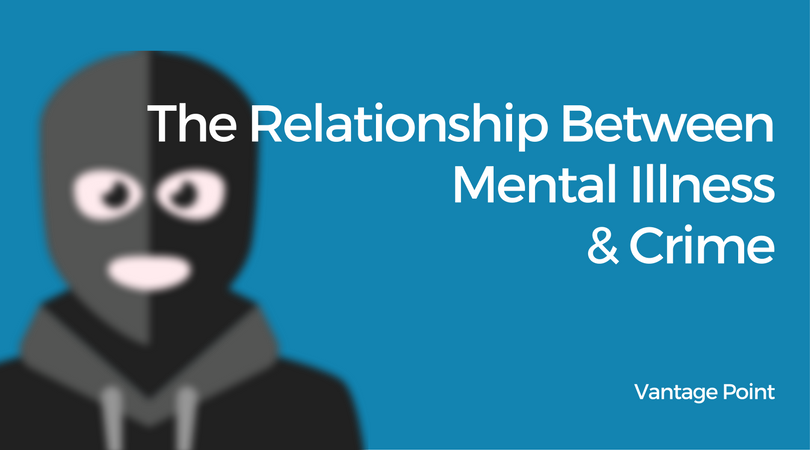Understanding The Link Between Mental Health And Violent Crime

Table of Contents
The Correlation Between Mental Illness and Violence
While it's crucial to avoid generalizations, research indicates a correlation between certain mental illnesses and an increased risk of violent behavior. It's vital to understand that correlation does not equal causation; many individuals with mental illnesses do not engage in violence. However, the link warrants careful consideration.
Types of Mental Illnesses Associated with Increased Risk
Several mental health conditions have been statistically associated with a higher likelihood of violent acts, though the risk varies greatly depending on individual circumstances and severity of the illness:
- Schizophrenia: Individuals experiencing untreated schizophrenia may exhibit symptoms like paranoia and hallucinations, potentially leading to aggressive behaviors in response to perceived threats. Studies suggest a small but elevated risk of violence compared to the general population.
- Bipolar Disorder: During manic episodes, individuals with bipolar disorder can experience impulsivity, irritability, and decreased judgment, increasing the potential for violent acts.
- Severe Depression: While not directly linked to violence as frequently as other conditions, severe depression can lead to feelings of hopelessness, desperation, and even suicidal ideation, which in some cases may manifest as aggression.
- Antisocial Personality Disorder (ASPD): This disorder is characterized by a disregard for the rights and feelings of others and a propensity for impulsive and reckless behavior, significantly increasing the risk of violent acts.
It's imperative to emphasize that the vast majority of individuals with these conditions do not commit violent crimes. These statistics highlight a correlation, not a deterministic link.
The Role of Untreated Mental Illness
The absence of adequate treatment significantly exacerbates the potential for violence in individuals with mental illnesses. Untreated symptoms can escalate, resulting in:
- Psychosis: Delusions and hallucinations can distort reality, leading to misinterpretations and potentially violent responses to perceived threats.
- Paranoia: Intense feelings of suspicion and distrust can fuel aggression and defensive actions.
- Mania: The heightened energy and impulsivity associated with mania can contribute to risky and potentially violent behaviors.
Early intervention and consistent treatment are essential in mitigating these risks and promoting better mental health outcomes, thereby decreasing the likelihood of violent acts.
Underlying Factors Contributing to the Link
The relationship between mental health and violent crime is rarely straightforward. Several underlying factors interact to increase the risk:
Socioeconomic Factors and Access to Healthcare
Socioeconomic disparities play a significant role. Poverty, lack of access to affordable mental healthcare, and social isolation can exacerbate existing mental health issues, increasing vulnerability and potentially leading to violent behavior. Affordable and accessible mental health services are crucial in addressing this inequality.
Substance Abuse and Mental Health
The co-occurrence of substance abuse and mental illness is alarmingly common. This dual diagnosis significantly increases the risk of violence. Substance use can worsen existing mental health symptoms, leading to:
- Substance-Induced Psychosis: Drug or alcohol use can trigger psychotic symptoms, increasing aggression and impulsivity.
- Increased Aggression: Many substances directly impact brain chemistry, leading to heightened aggression and reduced impulse control.
Trauma and Adverse Childhood Experiences (ACEs)
Trauma and ACEs, such as abuse, neglect, or witnessing violence, significantly increase the risk of developing mental health conditions later in life. These experiences can leave lasting impacts on brain development and emotional regulation, contributing to increased vulnerability to violent behavior. Trauma-informed care is essential in addressing these deeply rooted issues.
Addressing the Issue: Prevention and Intervention Strategies
Effectively addressing the complex interplay of mental health and violent crime requires a multi-pronged approach focusing on prevention and intervention:
Early Intervention and Mental Health Support
Early diagnosis and treatment of mental illnesses are crucial. Various therapeutic approaches, including:
- Therapy (e.g., Cognitive Behavioral Therapy, Dialectical Behavior Therapy): Helps individuals develop coping mechanisms and manage symptoms.
- Medication: Can effectively manage symptoms and reduce the risk of violent behavior in some cases.
are essential components of effective treatment plans.
Improving Access to Mental Healthcare
Increased funding for mental health services, coupled with efforts to reduce the stigma surrounding mental illness, are vital. This includes:
- Expansion of community-based mental health programs: Providing accessible and affordable services in local communities.
- Improved access to crisis intervention services: Offering immediate support during mental health emergencies.
Strengthening Social Support Networks
Strong social support systems play a crucial role in preventing violent behavior. This includes:
- Promoting family and community involvement: Encouraging supportive relationships and reducing social isolation.
- Developing peer support networks: Connecting individuals with others who understand their experiences.
Conclusion
The link between mental health and violent crime is complex and multifaceted. While not all individuals with mental illness are violent, the correlation highlights the urgent need for improved access to mental healthcare, early intervention strategies, and a reduction in the stigma surrounding mental illness. Understanding the link between mental health and violent crime is crucial for developing effective prevention and intervention strategies. Learn more about resources available in your community and advocate for improved mental health services. Let's work together to create a safer and more supportive environment for everyone.

Featured Posts
-
 Arctic Comic Con 2025 A Photo Gallery Featuring Characters Connections And The Ectomobile
May 09, 2025
Arctic Comic Con 2025 A Photo Gallery Featuring Characters Connections And The Ectomobile
May 09, 2025 -
 The Trump Administration And The Greenland Denmark Dynamic
May 09, 2025
The Trump Administration And The Greenland Denmark Dynamic
May 09, 2025 -
 The Fed And Interest Rates A Cautious Path Forward
May 09, 2025
The Fed And Interest Rates A Cautious Path Forward
May 09, 2025 -
 Challenges In Recovering Anchorage Fin Whale Skeleton The Role Of Thawing Mud And Rising Temperatures
May 09, 2025
Challenges In Recovering Anchorage Fin Whale Skeleton The Role Of Thawing Mud And Rising Temperatures
May 09, 2025 -
 Serious Threats To Madeleine Mc Canns Parents Under Police Investigation
May 09, 2025
Serious Threats To Madeleine Mc Canns Parents Under Police Investigation
May 09, 2025
